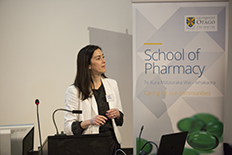
Dr Andrea Murphy from the College of Pharmacy at Dalhousie University spoke about the Bloom Program.
Pharmacists' role in mental health and addictions care was a topic of discussion at the 2018 Forward Pharmacy Symposium at the University of Otago, Wellington, in March.
Dr Andrea Murphy from the College of Pharmacy at Dalhousie University spoke about the Bloom Program, a successful mental health and addictions community pharmacy partnership in the province of Nova Scotia, Canada.
The programme's co-creator said Nova Scotia has less than one million people; 300 community pharmacies and 1200 pharmacists in hospitals and the community. The province has issues with high rates of psychotropic use.
Patients in crisis were an issue for the pharmacy workforce in Canada: “Our pharmacists are dealing with crisis situations on a daily basis, nearly.”
Bloom Program provides patients with a full assessment of their medications and related health issues, then over six months patients work with their pharmacist and health care team to resolve these issues.
Dr Murphy said that in developing this programme, it has been important to listen to people with lived experience of addictions and mental illness; to collaborate with other medical practitioners and community groups; and for Bloom pharmacies to practise a team-based approach.
Bloom Program is funded by the Nova Scotia Department of Health and Wellness and works in conjunction with Provincial Government. The programme is patient-centred, holistic, collaborative, evidence-informed and community-oriented.
She said patients appreciated that they could talk with pharmacists about medication, and felt supported and empowered. Patient feedback also showed that Bloom pharmacists were linking patients with medical and community resources; helping patients through addiction; advocating for those with mental illness; working as a team with doctors and other medical practitioners; and optimising medical outcomes.
Those pharmacists participating in the Bloom Program were organised and efficient, she said.
“The pharmacists that did participate, unsurprisingly, had a really sincere interest in mental health and addictions care.”
Dr Murphy was a guest speaker at the Symposium, which was attended by 60 general practitioners from throughout New Zealand, although most came from Wellington and surrounding cities. This year's theme was based around mental health.

Keynote speaker, Deputy Director and Principal Advisor for Mental Health at the Ministry of Health, New Zealand, Dr Ian Soosay.
“Last year we had almost 170,000 people being seen in mental health services,” he said. A large majority of those only accessed community services.
“From my point of view as a policy maker, you are a fabulous resource to utilise. The question is, how can we do that? What are the opportunities for innovation?”
Other speakers included Senior Lecturer, Department of Primary Health Care & General Practice, University of Otago, Wellington, Dr Caroline Morris and Director, Health Services Research, Faculty of Health, Victoria University of Wellington, Jackie Cumming, who spoke about Pharmacy in the Community: Solutions for Future Roles; and Professor Janie Sheridan, Pharmacy, Faculty of Medical and Health Sciences, University of Auckland, who spoke about Substance Misuse and Addictions – a Focus for Community Pharmacy.
The Symposium brought together pharmacy stakeholders including policymakers, funders, professional organisations and practising pharmacists to question the profession's current position and discuss international and local evidence on how to move this forward, to improve health outcomes at good value for money.

Forward Pharmacy attendees break into discussion groups for the afternoon.
The School of Pharmacy website says: “This symposium presents an ideal opportunity to discover pathways for improving New Zealand's pharmacy profession.”
The University of Otago School of Pharmacy Dean, Professor Carlo Marra, says “The focus of this Forward Pharmacy symposium was to identify and agree on a project that could be adopted by the pharmacy sector in New Zealand. We are delighted that the participants agreed that this project was adaptable to the NZ health care system and has the potential to have large improvements in health outcomes.”
Click here to read about the Bloom Program vision.
Article written by Sharon Fowler for School of Pharmacy Newsletter V3I1, May 2018